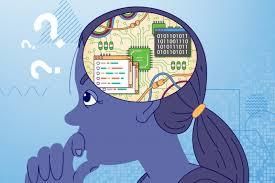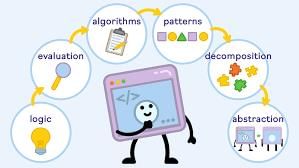Class 7 Exam > Class 7 Notes > Year 7 Computing (Cambridge) > Computational Thinking and Programming
Computational Thinking and Programming | Year 7 Computing (Cambridge) - Class 7 PDF Download
| Table of contents |

|
| Introduction to Computational Thinking |

|
| Key Concepts |

|
| Importance of Computational Thinking |

|
| Practical Applications |

|
Introduction to Computational Thinking
Computational thinking is a fundamental skill in today's digital world. It involves breaking down complex problems into smaller, manageable parts and devising a systematic approach to solve them using computers.
Key Concepts

Algorithms
- An algorithm is a step-by-step procedure or set of instructions designed to solve a specific problem or accomplish a task.
- Example: A recipe for baking a cake is an algorithm that outlines the steps from preparing ingredients to baking.
Flowcharts
- Flowcharts are visual representations of algorithms that use symbols to illustrate the sequence of steps in a process.
- Example: A flowchart for a simple task like making tea would include symbols for boiling water, adding tea leaves, and pouring tea into a cup.
Pseudocode
- Pseudocode is an informal way to outline a program using simple, human-readable language.
- Example:
Start
Input temperature
If temperature > 100
Print "Water is boiling"
Else
Print "Water is not boiling"
End
Programming Languages
- Programming languages like Python, Java, and C++ are used to write computer programs that execute tasks.
- Example: Writing a program in Python to calculate the area of a circle given its radius.
Iteration (Loops)
- Iteration involves repeating a block of code until a specific condition is met.
- Example: Using a loop to print numbers from 1 to 10.
Debugging
- Debugging is the process of finding and fixing errors or bugs in a program.
- Example: Identifying and correcting syntax errors in a program that prevents it from running.
Question for Computational Thinking and ProgrammingTry yourself: What is a flowchart?View Solution
Importance of Computational Thinking
Understanding computational thinking and programming concepts is crucial for several reasons:
- Problem-Solving: It enhances problem-solving abilities by breaking down complex problems into smaller, manageable parts.
- Logical Thinking: It develops logical thinking skills needed to design efficient algorithms and debug programs.
- Creativity: It fosters creativity in finding innovative solutions to challenges using computational tools.
- Career Readiness: It prepares students for careers in fields such as software development, data science, and engineering.
Practical Applications
Computational thinking and programming concepts are applied in various real-world scenarios:
- Web Development: Creating websites using HTML, CSS, and JavaScript.
- Data Analysis: Using Python or R to analyze and visualize data sets.
- Robotics: Programming robots to perform specific tasks using algorithms and sensors.
Conclusion
Computational thinking and programming are foundational skills that empower students to navigate and thrive in a technology-driven world. By mastering these concepts, students can become effective problem solvers and creators of innovative solutions.
The document Computational Thinking and Programming | Year 7 Computing (Cambridge) - Class 7 is a part of the Class 7 Course Year 7 Computing (Cambridge).
All you need of Class 7 at this link: Class 7
|
14 videos|5 docs|5 tests
|
Related Searches















